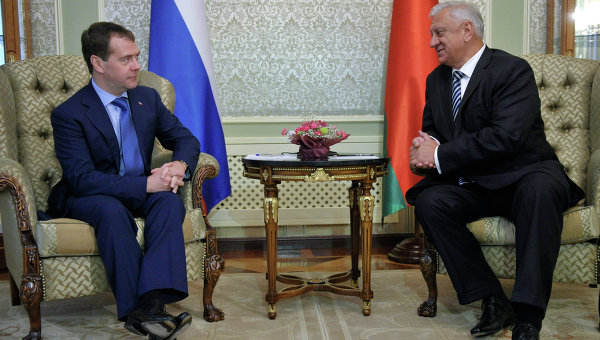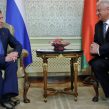
Belarus-Russia Integration Is Given a Boost
Publication: Eurasia Daily Monitor Volume: 10 Issue: 32
By:

While Minsk has been recently trying its best to revive its relationships with the West (see EDM, February 13), reciprocal steps have not yet been undertaken by the Western countries and international structures. On the contrary, on February 8, the EU proposed that Belarus’s human rights situation be on the agenda of the United Nations Human Rights Council’s session in June 2013 (https://naviny.by/rubrics/politic/2013/02/18/ic_news_112_411286/); and on February 12, the Council of Europe’s Commissioner for Human Rights published a comment containing an appeal to the member states not to “cooperate with the Belarusian authorities in any actions that may jeopardize the integrity and security of Belarusian human rights defenders” (https://humanrightscomment.org/2013/02/12/belarusian-human-rights-defenders-need-support/).
In contrast, Russia has been energetically and conspicuously acting to tighten its bonds with Belarus. On February 1, Russia and Belarus signed an intergovernmental agreement on nuclear security cooperation. This is the fourth major bilateral document having to do with the construction of a nuclear power plant (NPP) in Belarus. The first document, signed in May 2009, was a framework agreement stipulating the areas of cooperation. The second document, signed in October 2011, was a contractual agreement on the NPP’s construction. In November 2011, Russia committed itself to a $10 billion NPP-related loan to Belarus for a 25-year term, and in December 2012, Russia’s Vnesheconombank transferred its first $500 million tranche (https://www.energytribune.com/72340/belarus-russia-sign-nuclear-security-cooperation-agreement-2).
The military industrial complex is already the most advanced area of Belarus-Russia cooperation. On December 24, 2012, Russia’s government issued a ruling according to which Belarusian firms will participate in defense procurement tenders on an equal footing with Russian firms. Belarus is currently supplying more than 400 Russian defense production units with parts and semi-finished products. Belarusian firms specialize in navigational aids, flight systems, space and satellite communications, antennas, radio stations, aircraft and stationary computing systems, automation systems and software, as well as optical, control and assembly equipment for the manufacture of large-scale integrated circuits. Belarus produces a number of special types of equipment that have no analogues. This primarily refers to the severe multi-axial chassis designed for mounting various weapons systems, in particular road-mobile systems such as the “Yars” and “Topol-M.” Belarusian software and automated control systems of weapons and troops are also traditionally highly regarded by experts. In recent years, the development of aerial drones has been underway (https://naviny.by/rubrics/economic/2013/02/10/ic_articles_113_180787/).
It seems that Russia, a country that underwent painful deindustrialization under the guidance of the International Monetary Fund and several Western advisors is now looking at Belarus (which has retained and developed its industry) with ill-concealed envy. Indeed, Belarus has just scored 49th on Bloomberg’s list of 50 most innovative countries. Here is how the country ranked in the determining factors: R&D intensity—46th; productivity—47th; manufacturing capability—2nd; tertiary efficiency—5th; and patent activity—5th (https://www.bloomberg.com/slideshow/2013-02-01/50-most-innovative-countries.html#slide3).
On February 12, Russia’s Deputy Prime Minister Arkady Dvorkovich, who oversees energy issues, visited Belarus. Within one day he conducted negotiations with the Belarusian Prime Minister Mikhail Myasnikovich and paid visits to Gomselmash, a Gomel-based agricultural machinery plant, and to Grodno-based Azot, a highly automatized petrochemical enterprise. Along with the Minsk-based Integral, a flagship electronic firm, these enterprises are eyed by Russian tycoons who want to effectively buy them under the guise of creating joint-stock companies. Russia seems to have obtained a powerful tool of driving its Belarusian counterparts into submission. Specifically, Russia switched from the annual regime of negotiating its oil export quotas to Belarus to a quarterly regime, which helps Russia to maintain a constant level of pressure. While Russia expressed its readiness to sell 18.5 million tons of oil to Belarus in 2013, Belarus says it needs as much as 23 million tons to sustain full-capacity work of its two refineries. Also, Russia wants more refined oil products sold on its market, whereas Belarus prefers to sell them to Western buyers (https://bdg.by/news/economics/20567.html).
Finally, Russia’s trade wars with Belarus over its agricultural exports may now be abandoned. According to Belarus’s Minister of Agriculture Leonid Zayats, “One has to understand that we are effectively living in one state [referring to the Union State of Russia and Belarus], wherein the agricultural market should not be compartmentalized. By boosting its agricultural deliveries to the Russian market, Belarus does not compete with Russian producers; rather, it complements them.” In 2012, Belarus sold agricultural products to Russia totaling $2.661 billion, or 18.7 percent more than in 2011. In 2013, further expansion of Belarus’s agricultural exports is envisioned by the document titled “The predicted supply-demand balance sheet of the Union State for 2013,” signed in Moscow on February 13. Many Belarusian farms are the envy of Russians, especially from the regions abutting Belarus (Smolensk, Briansk and Pskov), because socio-demographic erosion of the countryside has converted much of those regions into a social desert. While Russia’s dependence on food exports continues to increase, Belarus—which is not in possession of naturally fertile soils—enjoys a $1.885 billion excess of food exports over food imports. Even in global rankings, Belarus can be considered a sizable exporter of some products. For example, it accounts for 8 percent of the world’s export of butter, 5–6 percent of cheese and 3 percent of whey. However, out of a total $2.9 billion worth of agricultural exports, only $91.9 million goes to countries outside the former Soviet Union (https://news.21.by/economics/2013/02/16/716829.html). Although the return on agricultural investments in Belarus is an area of concern to its leadership, by and large the country’s agriculture is one of its success stories along with its petrochemical, defense and potassium industries, as well as roads and infrastructure.
The visibility of these success stories appears to be clearest from the vantage points of Russia and Ukraine, the two states to which Belarusians most frequently compare their own country. Still, Belarus’s score on Bloomberg’s Innovation Index attests to the growing understanding of the Eastern European country’s potential in the West as well. In fact, this is all about the lenses through which one chooses to look at the world. All too often, a politicized lens obscures more than it reveals.




